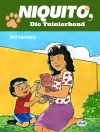In 'A Dog Named Chips: The Life and Adventures of a Mongrel Scamp, ’ Albert Payson Terhune crafts a charming and engaging narrative that explores the life of an adventurous and lovable canine. Through a series of vignettes, Terhune captures the essence of Chips, a mixed-breed dog whose escapades reflect not only his playful spirit but also the profound bond between humans and animals. The prose is imbued with a warm, conversational tone, resonating with readers of all ages, while the rich descriptions evoke a vivid sense of place and emotion that brings the character of Chips to life. Albert Payson Terhune was a celebrated author and dog enthusiast, known for his deep understanding of canine behaviors and the human-animal connection. His personal experiences with dogs, particularly his own beloved companions at Sunnybank, infuse the narrative with authenticity and affection. Terhune’s background in journalism and literature allowed him to develop a compelling storytelling style, making his works both accessible and insightful. This delightful tome is highly recommended for animal lovers and readers seeking heartwarming tales that explore loyalty and companionship. Terhune’s masterful storytelling and deeply felt observations of canine life will resonate with anyone who has ever shared their home with a dog, making 'A Dog Named Chips’ a timeless addition to the literature of pet memoirs.
O autorze
Albert Payson Terhune (1872-1942) was an American author, dog breeder, and journalist, best known for his novels detailing the adventures and heartwarming stories of collies and other loyal canine companions. His breed of choice was reflected in his Sunnybank Kennels, a name which also became synonymous with his literary setting for many of his pet narratives. Terhune’s passion for dogs was matched only by his skill as a storyteller, wherein his rich narratives often reflected the valor and intelligence of his four-legged subjects, bridging the gap between animal fiction and the celebration of pet virtues. In 'A Dog Named Chips: The Life and Adventures of a Mongrel Scamp, ’ Terhune departs from his usual collie protagonists to weave the spirited tale of Chips, a lovable mixed-breed with an indomitable spirit. The novel stands out in Terhune’s bibliography for showcasing not only the pedigree of purebred dogs but also the charm and heroism inherent in a scrappy underdog. Terhune’s literary style often combined realistic depictions of canine behavior with idealized portrayals of dog loyalty and bravery, offering readers an enjoyable and immersive dive into the lives and inner world of animals. His works continue to resonate with dog enthusiasts and remain emblematic of early 20th-century animal literature.












